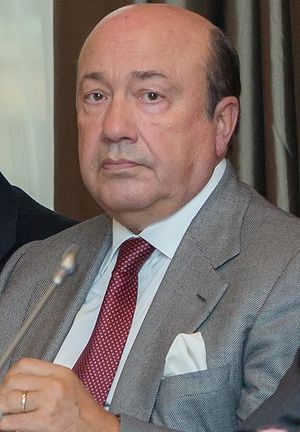Igor Ivanov
(diplomat) | |
|---|---|
 | |
| Born | 1945-09-23 Moscow, Soviet Union |
| Nationality | Russian |
| Alma mater | Moscow State Linguistic University |
| Member of | European Council on Tolerance and Reconciliation, European Leadership Network, Nuclear Threat Initiative, Russia/Deep state |
Igor Sergeyevich Ivanov is a Russian politician who was Foreign Minister of Russia from 1998 to 2004, and belongs to the "pro-Western" camp in Russian politics.
Contents
Early life
Ivanov was born in 1945 in Moscow to a Russian father and a Georgian mother (Elena Sagirashvili). In 1969 he graduated at the Maurice Thorez Moscow Institute of Foreign Languages (Moscow State Linguistic University). He joined the Soviet Foreign Ministry in 1973 and spent a decade in Spain. He returned to the Soviet Union in 1983. In 1991 he became the ambassador in Madrid.
Minister of Foreign Affairs
He was appointed Minister of Foreign Affairs on September 11, 1998. As Russian foreign minister, Ivanov was an opponent of NATO's war against the Yugoslavia in Kosovo. When Russian troops entered Kosovo ahead of NATO "peacekeepers", Ivanov opposed it, and said the move was "unfortunate mistake"[1], but was made "at the highest level." (The decision, which secured a Russian say in the region, was in fact made by the still unknown Vladimir Putin).
He was also an opponent of the U.S. invasion of Iraq, but the opposition did not go beyond words.
Ivanov played a key role in mediating a deal between Georgian President Eduard Shevardnadze and opposition parties during Georgia's "Rose Revolution" in 2003. Shevardnadze resigned and the new government pursued a decidedly pro-Western foreign policy and declared NATO and EU integration as its main priority, before going to war against Russia in 2008.
Resignation
Ivanov was succeeded to the post of foreign minister by Sergey Lavrov in 2004, and appointed by President Vladimir Putin to the post of Secretary of the Security Council, followed shortly by the appointment of Sergey Lavrov as foreign minister.
On 9 July 2007 he submitted his resignation.[2] On 18 July, President Putin accepted Ivanov's resignation and appointed Valentin Sobolev as acting secretary,
Ivanov is professor of Moscow State Institute of International Relations (MGIMO-University), member of the Supervisory Council of the International Luxembourg Forum on Preventing Nuclear Catastrophe and member of the European Council on Tolerance and Reconciliation. Igor Ivanov is the President of Russian International Affairs Council (RIAC).[3]
In 2011 Ivanov became a member of the advisory council of The Hague Institute for Global Justice and in 2014 worked for Dutch-financed newspaper The Moscow Times.[4]
Events Participated in
| Event | Start | End | Location(s) | Description |
|---|---|---|---|---|
| Bilderberg/2012 | 31 May 2012 | 3 June 2012 | US Virginia Chantilly | The 58th Bilderberg, in Chantilly, Virginia. Unusually just 4 years after an earlier Bilderberg meeting there. |
| Munich Security Conference/2009 | 2009 | 2009 | Germany Munich Bavaria | The 45th Munich Security Conference |
| Munich Security Conference/2010 | 5 February 2010 | 7 February 2010 | Germany Munich Bavaria | An anti-war demonstration outside described it as "Nothing more than a media-effectively staged war propaganda event, which this year had the purpose of justifying the NATO troop increase in Afghanistan and glorifying the continuation of the war as a contribution to peace and stability." |
| Munich Security Conference/2011 | 4 February 2011 | 6 February 2011 | Germany Munich Bavaria | The 47th Munich Security Conference |
| Munich Security Conference/2012 | 3 February 2012 | 5 February 2012 | Germany Munich Bavaria | The 48th Munich Security Conference |
| Munich Security Conference/2013 | 1 February 2013 | 3 February 2013 | Germany Munich Bavaria | The 49th Munich Security Conference |
| Munich Security Conference/2014 | 31 January 2014 | 2 February 2014 | Germany Munich Bavaria | The 50th Munich Security Conference |
| Munich Security Conference/2015 | 6 February 2015 | 8 February 2015 | Germany Munich Bavaria | "400 high-ranking decision-makers in international politics, including some 20 heads of state and government as well as more than 60 foreign and defence ministers, met in Munich to discuss current crises and conflicts." |
| Munich Security Conference/2016 | 12 February 2016 | 14 February 2016 | Germany Munich Bavaria | The 52nd Munich Security Conference |
| Munich Security Conference/2017 | 17 February 2017 | 19 February 2017 | Germany Munich Bavaria | The 53rd Munich Security Conference |
| Munich Security Conference/2018 | 12 February 2018 | 14 February 2018 | Germany Munich Bavaria | The 54th Munich Security Conference |
| Munich Security Conference/2019 | 15 February 2019 | 17 February 2019 | Germany Munich Bavaria | The 55th Munich Security Conference, which included "A Spreading Plague" aimed at "identifying gaps and making recommendations to improve the global system for responding to deliberate, high consequence biological events." |
| Munich Security Conference/2020 | 14 February 2020 | 16 February 2020 | Germany Munich Bavaria | The 56th Munich Security Conference, in 2020, "welcomed an unprecedented number of high-ranking international decision-makers." |
| Munich Security Conference/2022 | 18 February 2022 | 20 February 2022 | Germany Munich Bavaria | Slightly less than 1/3 of the 664 of the participants have pages here |
References
- ↑ http://edition.cnn.com/WORLD/europe/9906/12/russia.kosovo.01/
- ↑ https://web.archive.org/web/20140726032433/http://www.nytimes.com/2007/07/10/world/europe/10briefs-Ray-Ivanov.html?_r=3&oref=slogin&oref=slogin&oref=slogin
- ↑ http://russiancouncil.ru/en/about-us/presidium
- ↑ https://web.archive.org/web/20140727193642/http://www.themoscowtimes.com/sitemap/authors/175128.html